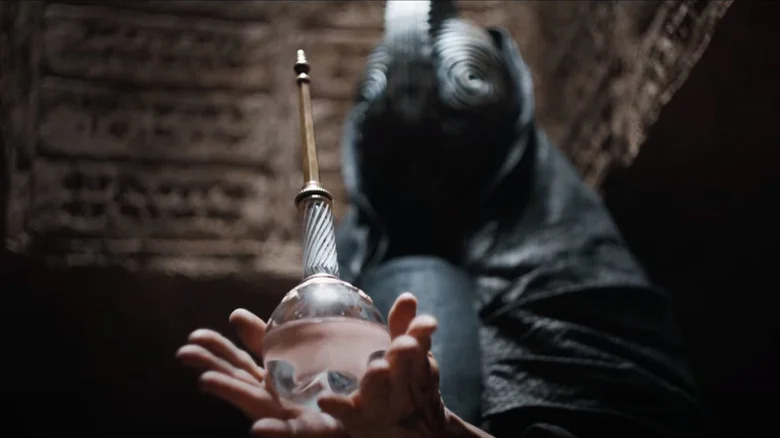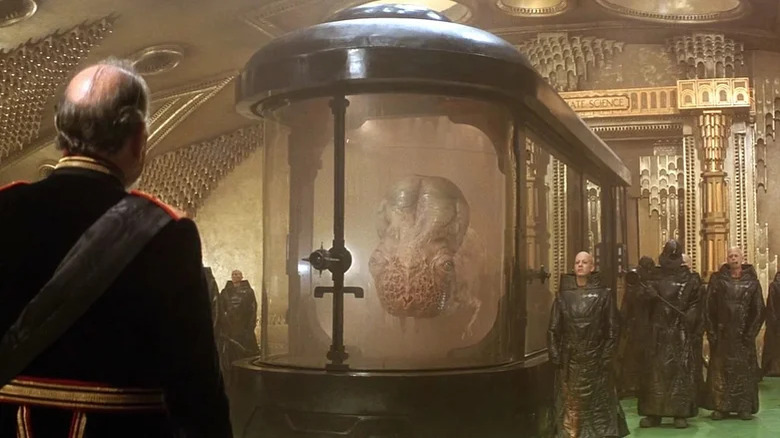Dune: Part Two's Spice Is Never Properly Explained, So Let Us Do It For You
"Dune" is one of the most acclaimed and influential science fiction books of all time, one with intricate worldbuilding, complex characters, and deep themes. It's no wonder filmmakers have long been fascinated with the material, and why it's been so tricky to get it right.
Thankfully, Denis Villeneuve cracked the code, filling his two-part adaptation of "Dune" delivering a bleak blockbuster with as many complex themes as it has massive spectacle and giant worms. This is a movie all about the dangers of messianic figures, about revolts and revolution, about how the desert is a brutal environment that has people pass out left and right on set and in the story.
In a film as dense as this, with as many moving elements and storylines, some things will inevitably fall off, be cut out, or simply be too confusing without all the context. One of the most confusing elements in Denis Villeneuve's "Dune" is the spice melange. We are constantly told that the spice is the single most important and valuable substance in the known universe, enough to take down empires. And yet, we don't really know how it works or why it is so valuable. That's what we're here for, to break down what melange is, and how it became the key to the rise of Muad'Dib Usul.
He who controls the spice controls the universe
The first thing to know about the spice melange is that it is said to taste and smell like cinnamon. Beyond that, though, it is also a huge sign of wealth and influence in the known universe, mixed with food and drinks. The more spice is part of your daily life, the more influence it means you have. (It's also a not-subtle-at-all allegory for oil.)
The spice also has practical uses beyond just making food taste better, of course.
First, the melange serves as a drug that helps slow down the aging process and can vastly extend the life of those who take it. It is also used to expand the human consciousness, awakening the parts of our brains we don't use and giving the user expanded senses. In certain individuals, the spice can lead to prescience — seeing the past, present, and future — which is why it's crucial for the religious order known as the Bene Gesserit and also for the Spacing Guild.
This is why the spice is not just a luxury, but absolutely vital for the known universe, because it gives the former group the power of clairvoyance, and to the latter it allows the ability to navigate through space.
Granted, it is still very much a drug, and it has side effects. For one, the spice is very addictive, and it can change your physicality. Sustained use leads to eyes becoming a deep blue color at best, and bizarre mutations at worst — such as with the Guild Navigators.
For the Fremen, who have all the spice access they could possibly want, it is part of every aspect of their culture. They use it in clothing, on paper, and in explosives.
The spice must flow
How and why melange became so heavily used is never really alluded to in Villeneuve's movies (though it is part of the prologue in Lynch's underrated version). The reason is because of the Butlerian Jihad, a holy war wherein all "thinking machines" were hunted down and destroyed after they enslaved humanity. The war resulted in a deep, long-lasting fear and hatred of machines that could replace humans in tasks. It lasted almost a century and resulted in the loss of most historical documents.
Now that computers were out of the way, they were replaced by three schools that specialized in developing the mind — the Mentat order, the Bene Gesserit, and the Spacing Guild. The Mentats, or human computers, replaced thinking machines when it came to computing, and are known for their vast memory and skill to organize huge amount of data.
The Bene Gesserit, who used spice to open their mind, use the power of prescience to secretly influence politics in the world of "Dune." Then there's the Spacing Guild and their Navigators, who took over interstellar travel from the computers. Without the Navigators, who use spice to get really high and find the right route through space, interstellar travel is extremely dangerous, and both transport and trade stop to a halt.
But where does the spice come from? Well, it's sandworm poop. Really, it is the fungal excretions of sandworm larvae that is mixed with water deep under the sands of Arrakis. That mixture is brought to the surface through pressure explosions underground, and after interacting with the hot air of the surface, melange is formed. This becomes essential to the story that comes after "Dune," particularly "Dune: Messiah."


